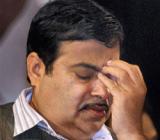
New Delhi, November 10: BJP President Nitin Gadkari today faced a fresh attack with party national executive member Jagadish Shettigar demanding that he should step down from the top post in the wake of charges of dubious funding of his Purti Group.
"Gadkari is also a swayamsewak (RSS worker) whose dharma (principle) is to protect the interest of the country first and then protect the interest of the organisation. So I am sure being a Swayamsewak as per the conscience he will take the best step in the overall interest of the country and the organisation," Shettigar said
He maintained that timely action on Gadkari's part is crucial. The leader maintained that public perception is important and Gadkari should step down till the process of investigations is completed.
Shettigar cited the example of BJP leader L K Advani who had stepped down when allegations were levelled against him in the Hawala case. He had also announced that he will not contest any elections.
He refused to speak on the clean chit given to Gadkari by RSS ideologue S Gurumurthy, saying he had not studied his report. However, he said there should be an internal mechanism to identify whether a person is involved in corruption.
"If what has been reported is correct then I think it is not as per what you call the norms of SEBI or other institutions," Shettigar said.
Before Shettigar, BJP Rajya Sabha MP Ram Jethmalani and his son Mahesh had said Gadkari should immediately step down from his post as the charges against him were damaging the party. He claimed to have the support of other party leaders like Jaswant Singh, Yashwant Sinha and Shatrughan Sinha.





Comments
Add new comment